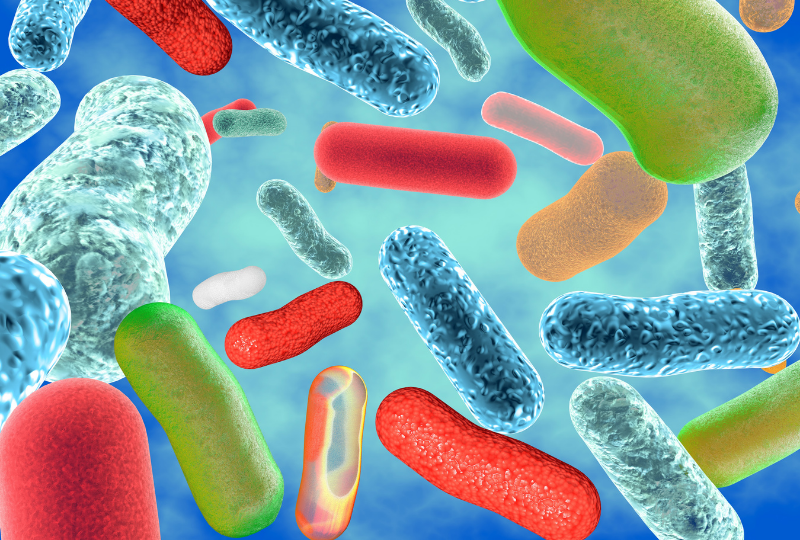 There’s a lot we have learned about the gut microbiome, some of which has led to groundbreaking discoveries about human health.
There’s a lot we have learned about the gut microbiome, some of which has led to groundbreaking discoveries about human health.The past decade has seen great advancements in gut microbiome analysis technology, led by Microba’s co-founders, Professors Phil Hugenholtz and Gene Tyson, who were able to make world-leading microbiome analysis available to the general public, right here in Australia.
Through this technology, scientists are building a growing body of evidence showing the links between the microorganisms in our gut and various health conditions. As we continue to investigate this fascinating area, we are discovering more about the gut microbiome every day, including a few interesting facts you may not have heard about yet!
1. Who you live with helps shape your gut microbiome
We inherit a lot from our parents, including some of the core species of bacteria that are commonly found in the human gut microbiome. However, unlike eye colour or blood type, environmental factors have the potential to shape our microbiome more than our genes. A recent study found that the gut microbiomes of cohabiting, but unrelated individuals, were more similar than related people living apart. In fact, the microbiomes of parents and their children or pairs of siblings living separately were no more similar than they were to unrelated individuals. This could be because people living together might eat the same foods, share similar lifestyle habits or be exposed to the same environmental microbes. Together, this adds to a growing body of evidence that your environment – including who you live with – actually has a more significant impact on the microbiome than genetics.
2. Living on a farm or playing outside as a child is good for your microbiome
We know getting outside has numerous benefits for our physical, mental and social health. It turns out that spending more time outdoors as a child can have a lasting impact on your gut microbiome, too. A recent study found that childhood living environment, such as living in a rural area or owning a pet, had lasting effects on the microbiome of adults, and these microbiome signatures were associated with better general health. It’s okay if you didn’t happen to live on a farm as a child – having more green space in your living environment as an adult can benefit the gut microbiome as well. This is a reminder that we often forget about the importance of getting out in nature, but it’s a simple way to improve the health of your microbiome.
3. Common prescription drugs (and not just antibiotics) have an impact on the microbiome.
While the impact of antibiotic use on the gut microbiome has stolen the spotlight, we now know that other commonly prescribed drugs can also have unintended consequences for this community of microbes. Recent metagenomic studies have shown that in addition to antibiotics, proton pump inhibitors (PPIs), anti-diabetic drugs, anti-inflammatory agents and laxatives have a strong impact on the structure and function of the gut microbiome. For example, PPI use was associated with an increase in species that are usually only found in the mouth, as well as a decrease in beneficial gut microorganisms. These recent insights highlight the need to consider not only how a drug will affect us, but how it will impact our gut microbiome.
If you are concerned that a medication you are taking might be negatively impacting your microbiome it is important to discuss this with the prescribing health care professional before making any changes to your medication regime.
4. Popular probiotic species aren’t as common in the gut as you might think.
Bifidobacterium and Lactobacilli species are the stars of any probiotic aisle, making it seem like they are essential for a healthy microbiome. But in fact, neither group of bacteria are found in the microbiome of most adults. Bifidobacterium species are common in the infant gut but decrease as we get older. In Microba’s own database, the gut microbiomes of healthy individuals showed that Bifidobacterium species only made up 0 – 1.02% of the total microbiome population, with Lactobacillus species present in less than 3% of Australian gut microbiomes. It should also be noted that, while having beneficial functions and being easy to study in the lab, Lactobacillus species do not tend to colonise the human gut. So, don’t worry if you don’t have these bacteria, there are plenty of other beneficial microbes that perform similar functions to look for!
5. Your gut microbiome can influence how you respond to a certain diet.
The Mediterranean diet has long been praised for its health benefits. Recent studies have revealed that this diet – high in fruits, vegetables, whole grains, nuts and olive oil and low in red meat and refined grains – is linked to improved metabolic and cardiovascular health through positive changes in the gut microbiome. For example, this healthy eating pattern is associated with an increase in beneficial microbial functions, such as short chain fatty acid production. Interestingly, this effect was strongest in people who had a lower abundance of a species called Prevotella copri (P. copri), suggesting that your baseline microbiome influences how you respond to a particular diet. This is supported by another study, which found that an individual’s baseline microbiome was able to predict how they would respond to a six-month weight loss program. Together, this work provides the foundation for future research that may help us understand how gut microbiome analysis can help guide personalised dietary patterns.
Summary
Advancements in microbiome sequencing technology has enabled an explosion of research helping us to understand how our microbiome influences our health but also how our diet, lifestyle, medication and supplement use impact our microbiome.
Author: Dr Kaylyn Tousignant Microba,
Leave a Reply